2019 Lexus LC500h bulb
[x] Cancel search: bulbPage 1 of 432
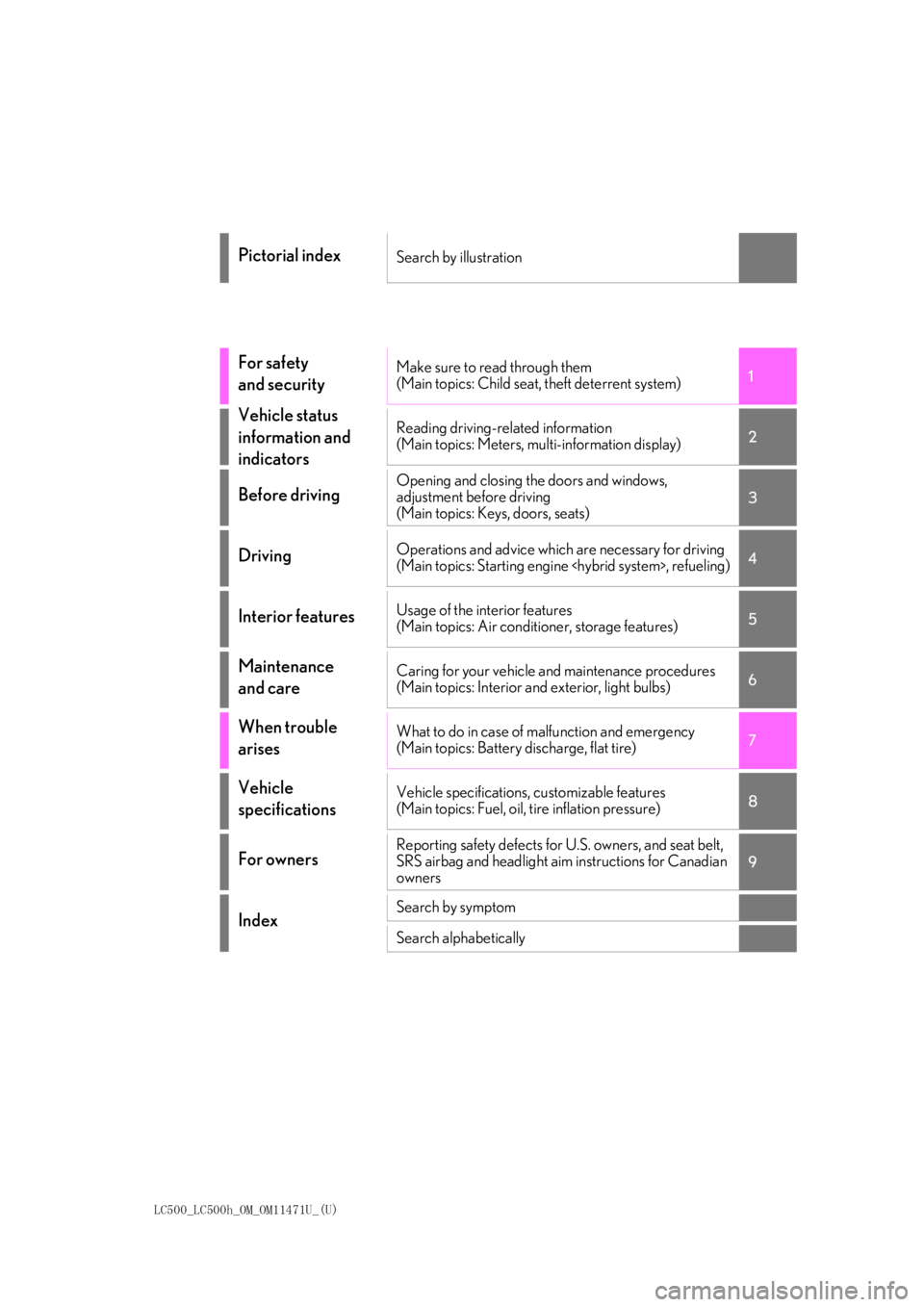
LC500_LC500h_OM_OM11471U_(U)
1
2
3
4
5
6
7
8
9
Pictorial indexSearch by illustration
For safety
and securityMake sure to read through them
(Main topics: Child seat, theft deterrent system)
Vehicle status
information and
indicatorsReading driving-related information
(Main topics: Meters, multi-information display)
Before drivingOpening and closing the doors and windows,
adjustment before driving
(Main topics: Keys, doors, seats)
DrivingOperations and advice which are necessary for driving
(Main topics: Starting engine
Interior featuresUsage of the interior features
(Main topics: Air conditioner, storage features)
Maintenance
and careCaring for your vehicle and maintenance procedures
(Main topics: Interior and exterior, light bulbs)
When trouble
arisesWhat to do in case of malfunction and emergency
(Main topics: Battery discharge, flat tire)
Vehicle
specificationsVehicle specifications, customizable features
(Main topics: Fuel, oil, tire inflation pressure)
For ownersReporting safety defects for U.S. owners, and seat belt,
SRS airbag and headlight aim instructions for Canadian
owners
IndexSearch by symptom
Search alphabetically
Page 4 of 432
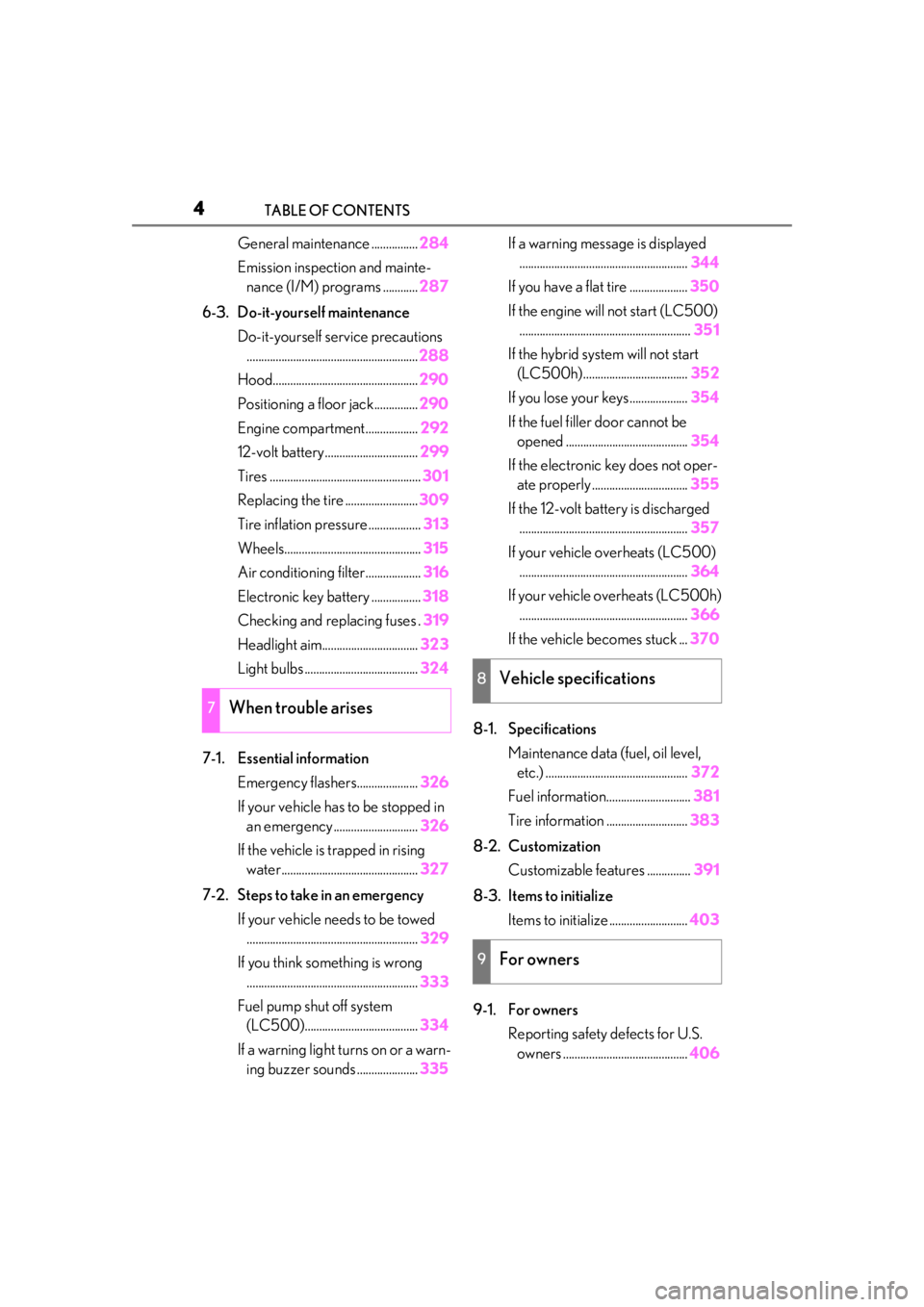
4TABLE OF CONTENTS
General maintenance ................284
Emission inspection and mainte- nance (I/M) programs ............ 287
6-3. Do-it-yourself maintenance Do-it-yourself service precautions........................................................... 288
Hood.................................................. 290
Positioning a floor jack............... 290
Engine compartment.................. 292
12-volt battery................................ 299
Tires .................................................... 301
Replacing the tire ......................... 309
Tire inflation pressure .................. 313
Wheels............................................... 315
Air conditioning filter...................316
Electronic key battery ................. 318
Checking and replacing fuses . 319
Headlight aim................................. 323
Light bulbs ....................................... 324
7-1. Essential information Emergency flashers..................... 326
If your vehicle has to be stopped in an emergency ............................. 326
If the vehicle is trapped in rising water............................................... 327
7-2. Steps to take in an emergency If your vehicle needs to be towed........................................................... 329
If you think something is wrong ........................................................... 333
Fuel pump shut off system (LC500)....................................... 334
If a warning light turns on or a warn- ing buzzer sounds ..................... 335If a warning messa
ge is displayed
.......................................................... 344
If you have a flat tire .................... 350
If the engine will not start (LC500) ........................................................... 351
If the hybrid syst em will not start
(LC500h).................................... 352
If you lose your keys.................... 354
If the fuel filler door cannot be opened .......................................... 354
If the electronic key does not oper- ate properly ................................. 355
If the 12-volt battery is discharged .......................................................... 357
If your vehicle overheats (LC500) .......................................................... 364
If your vehicle overheats (LC500h) .......................................................... 366
If the vehicle becomes stuck ... 370
8-1. Specifications Maintenance data (fuel, oil level, etc.) ................................................. 372
Fuel information............................. 381
Tire information ............................ 383
8-2. Customization Customizable features ............... 391
8-3. Items to initialize Items to
initialize ........................... 403
9-1. For owners Reporting safety defects for U.S. owners ........................................... 406
7When trouble arises
8Vehicle specifications
9For owners
Page 13 of 432
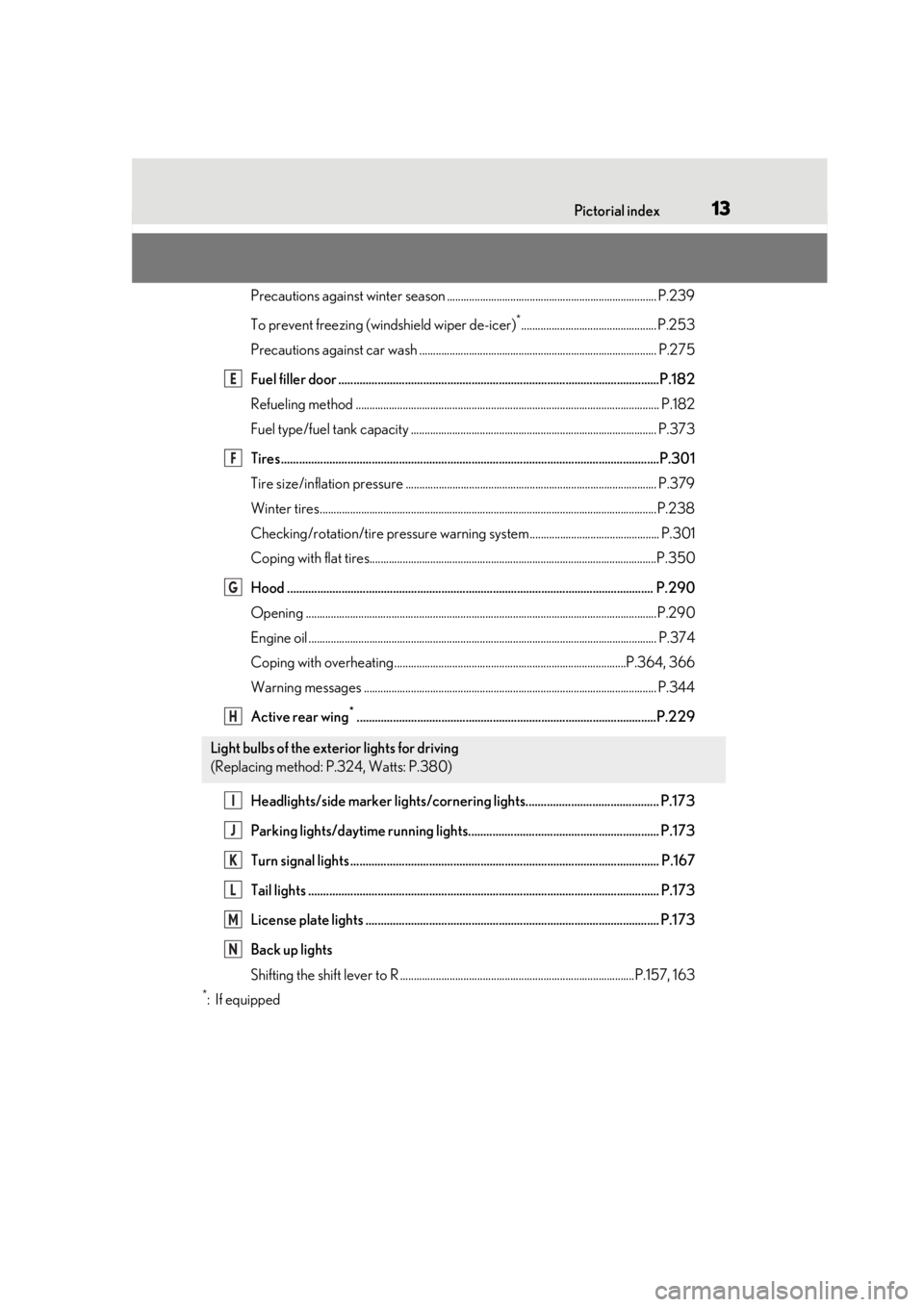
13Pictorial index
Precautions against winter season ............................................................................ P.239
To prevent freezing (windshield wiper de-icer)
*................................................. P.253
Precautions against car wash ...................................................................................... P.275
Fuel filler door ..........................................................................................................P.182
Refueling method .............................................................................................................. P .182
Fuel type/fuel tank capacity ...... ................................................................................... P.373
Tires.......................................................................................................................... ...P.301
Tire size/inflation pressure ........................................................................................... P.379
Winter tires..........................................................................................................................P.238
Checking/rotation/tire pressure warning system............................................... P.301
Coping with flat tires........................................................................................................P .350
Hood ......................................................................................................................... P. 290
Opening ........................................................................................................................ .......P.290
Engine oil ..................................................................................................................... ......... P.374
Coping with overheating ....................................................................................P.364, 366
Warning messages .......................................................................................................... P.344
Active rear wing
*...................................................................................................P.229
Headlights/side marker lights/cornering lights............................................ P.173
Parking lights/daytime running lights............................................................... P.173
Turn signal lights ...................................................................................................... P.167
Tail lights .................................................................................................................... P.173
License plate lights ................................................................................................. P.173
Back up lights
Shifting the shift lever to R .....................................................................................P.157, 163
*:If equipped
Light bulbs of the exterior lights for driving
(Replacing method: P.324, Watts: P.380)
E
F
G
H
I
J
K
L
M
N
Page 167 of 432
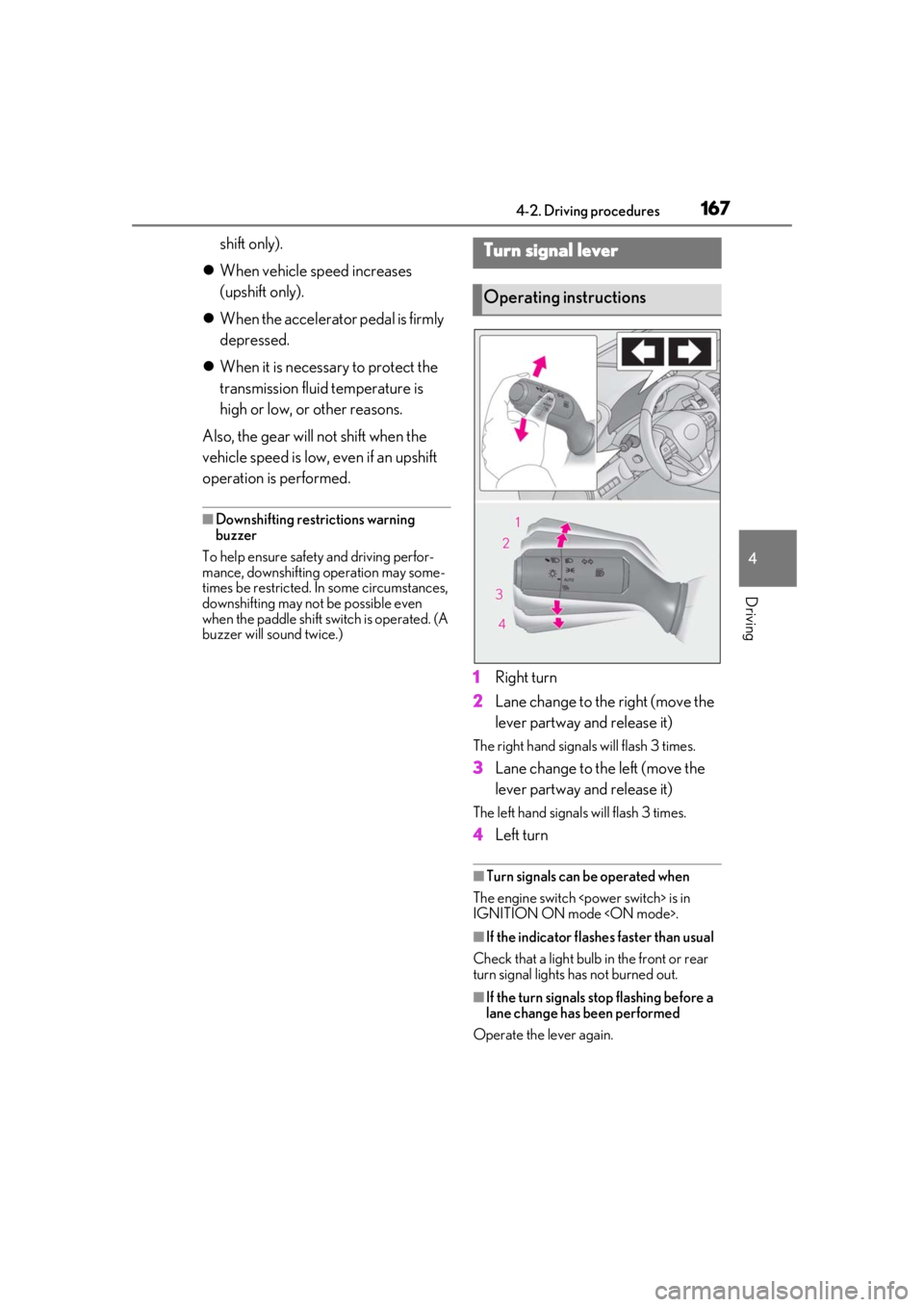
1674-2. Driving procedures
4
Driving
shift only).
When vehicle speed increases
(upshift only).
When the accelerator pedal is firmly
depressed.
When it is necessary to protect the
transmission fluid temperature is
high or low, or other reasons.
Also, the gear will not shift when the
vehicle speed is low, even if an upshift
operation is performed.
■Downshifting restrictions warning
buzzer
To help ensure safety and driving perfor-
mance, downshifting operation may some-
times be restricted. In some circumstances,
downshifting may not be possible even
when the paddle shift switch is operated. (A
buzzer will sound twice.)
1 Right turn
2 Lane change to the right (move the
lever partway and release it)
The right hand signals will flash 3 times.
3Lane change to the left (move the
lever partway and release it)
The left hand signals will flash 3 times.
4Left turn
■Turn signals can be operated when
The engine switch
IGNITION ON mode
■If the indicator flashes faster than usual
Check that a light bulb in the front or rear
turn signal lights has not burned out.
■If the turn signals stop flashing before a
lane change has been performed
Operate the lever again.
Turn signal lever
Operating instructions
Page 273 of 432
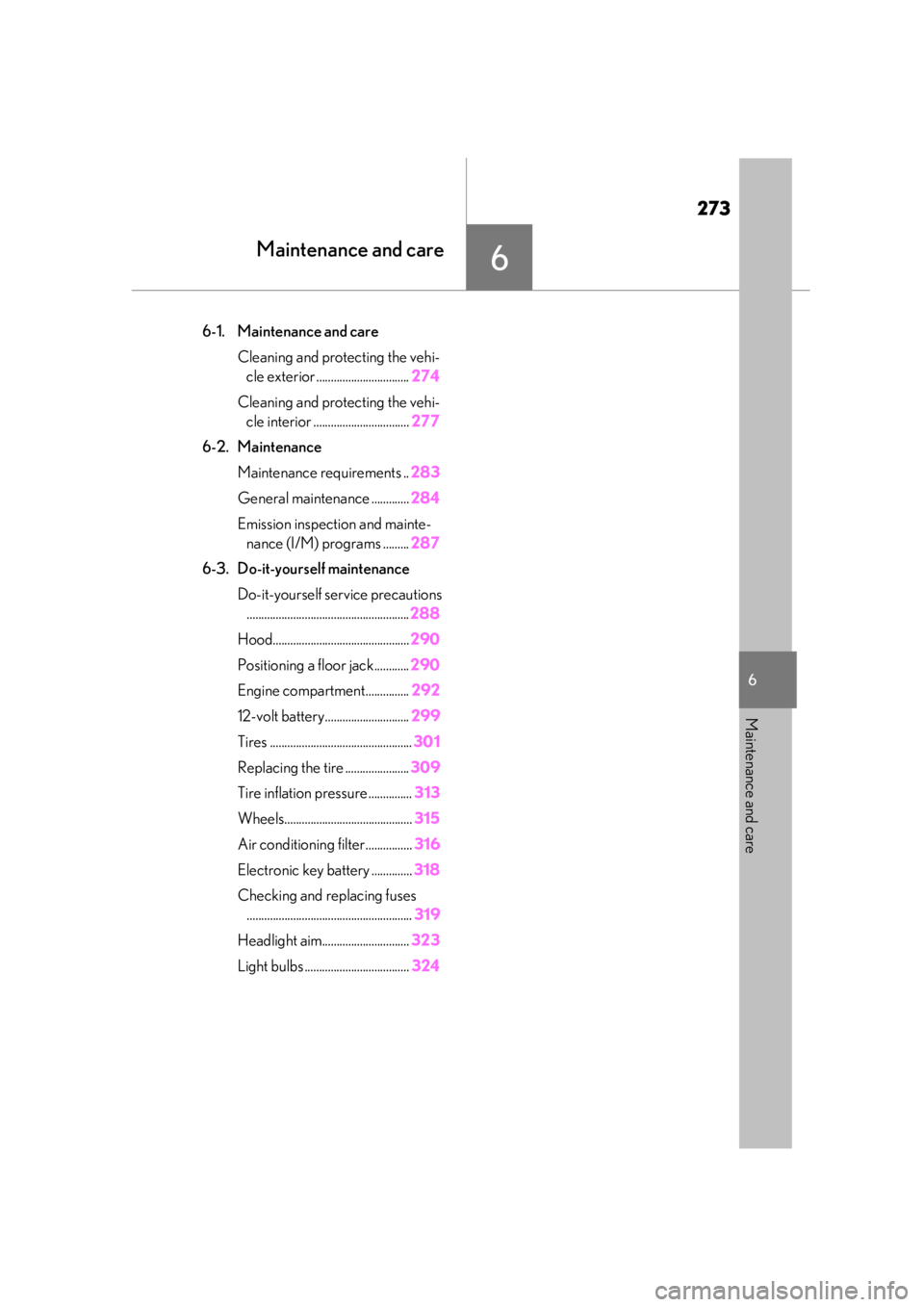
273
6
6
Maintenance and care
Maintenance and care
6-1. Maintenance and careCleaning and protecting the vehi-cle exterior ................................ 274
Cleaning and protecting the vehi- cle interior ................................. 277
6-2. Maintenance Maintenance requirements .. 283
General maintenance ............. 284
Emission inspection and mainte- nance (I/M) programs ......... 287
6-3. Do-it-yourself maintenance Do-it-yourself service precautions........................................................ 288
Hood............................................... 290
Positioning a floor jack............ 290
Engine compartment............... 292
12-volt battery............................. 299
Tires ................................................. 301
Replacing the tire ...................... 309
Tire inflation pressure ............... 313
Wheels............................................ 315
Air conditioning filter................316
Electronic key battery .............. 318
Checking and replacing fuses ......................................................... 319
Headlight aim.............................. 323
Light bulbs .................................... 324
Page 289 of 432
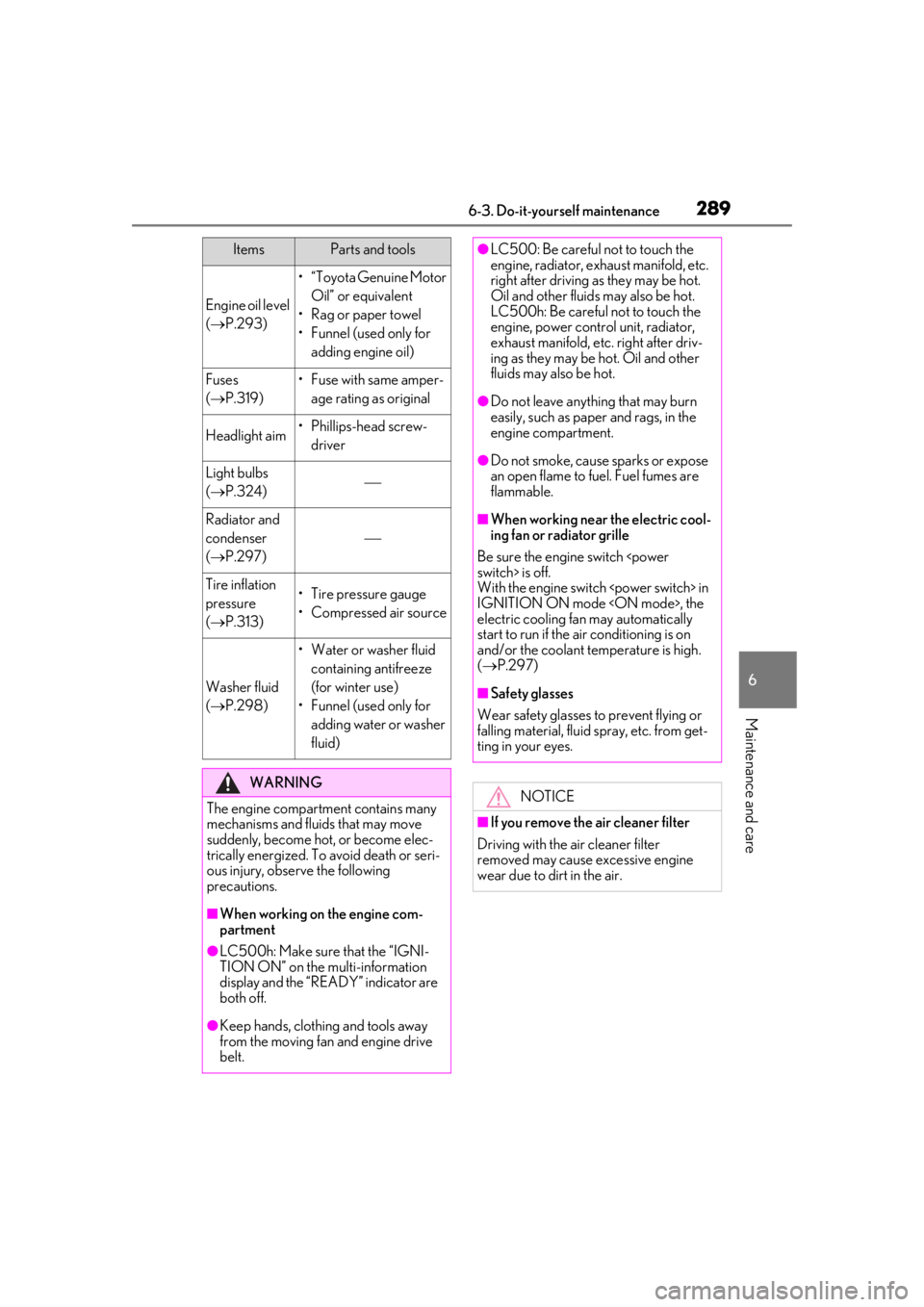
2896-3. Do-it-yourself maintenance
6
Maintenance and care
Engine oil level
( P.293)
• “Toyota Genuine Motor
Oil” or equivalent
• Rag or paper towel
• Funnel (used only for adding engine oil)
Fuses
( P.319)•Fuse with same amper-
age rating as original
Headlight aim• Phillips-head screw-driver
Light bulbs
( P.324)
Radiator and
condenser
( P.297)
Tire inflation
pressure
( P.313)• Tire pressure gauge
• Compressed air source
Washer fluid
( P.298)
• Water or washer fluid
containing antifreeze
(for winter use)
• Funnel (used only for adding water or washer
fluid)
WARNING
The engine compartment contains many
mechanisms and fluids that may move
suddenly, become hot, or become elec-
trically energized. To avoid death or seri-
ous injury, observe the following
precautions.
■When working on the engine com-
partment
●LC500h: Make sure that the “IGNI-
TION ON” on the multi-information
display and the “READY” indicator are
both off.
●Keep hands, clothi ng and tools away
from the moving fan and engine drive
belt.
ItemsParts and tools●LC500: Be careful not to touch the
engine, radiator, exhaust manifold, etc.
right after driving as they may be hot.
Oil and other fluids may also be hot.
LC500h: Be careful not to touch the
engine, power control unit, radiator,
exhaust manifold, etc. right after driv-
ing as they may be hot. Oil and other
fluids may also be hot.
●Do not leave anything that may burn
easily, such as paper and rags, in the
engine compartment.
●Do not smoke, cause sparks or expose
an open flame to fuel. Fuel fumes are
flammable.
■When working near the electric cool-
ing fan or radiator grille
Be sure the engine switch
With the engine switch
IGNITION ON mode
electric cooling fan may automatically
start to run if the air conditioning is on
and/or the coolant temperature is high.
( P.297)
■Safety glasses
Wear safety glasses to prevent flying or
falling material, fluid spray, etc. from get-
ting in your eyes.
NOTICE
■If you remove the air cleaner filter
Driving with the air cleaner filter
removed may cause excessive engine
wear due to dirt in the air.
Page 322 of 432
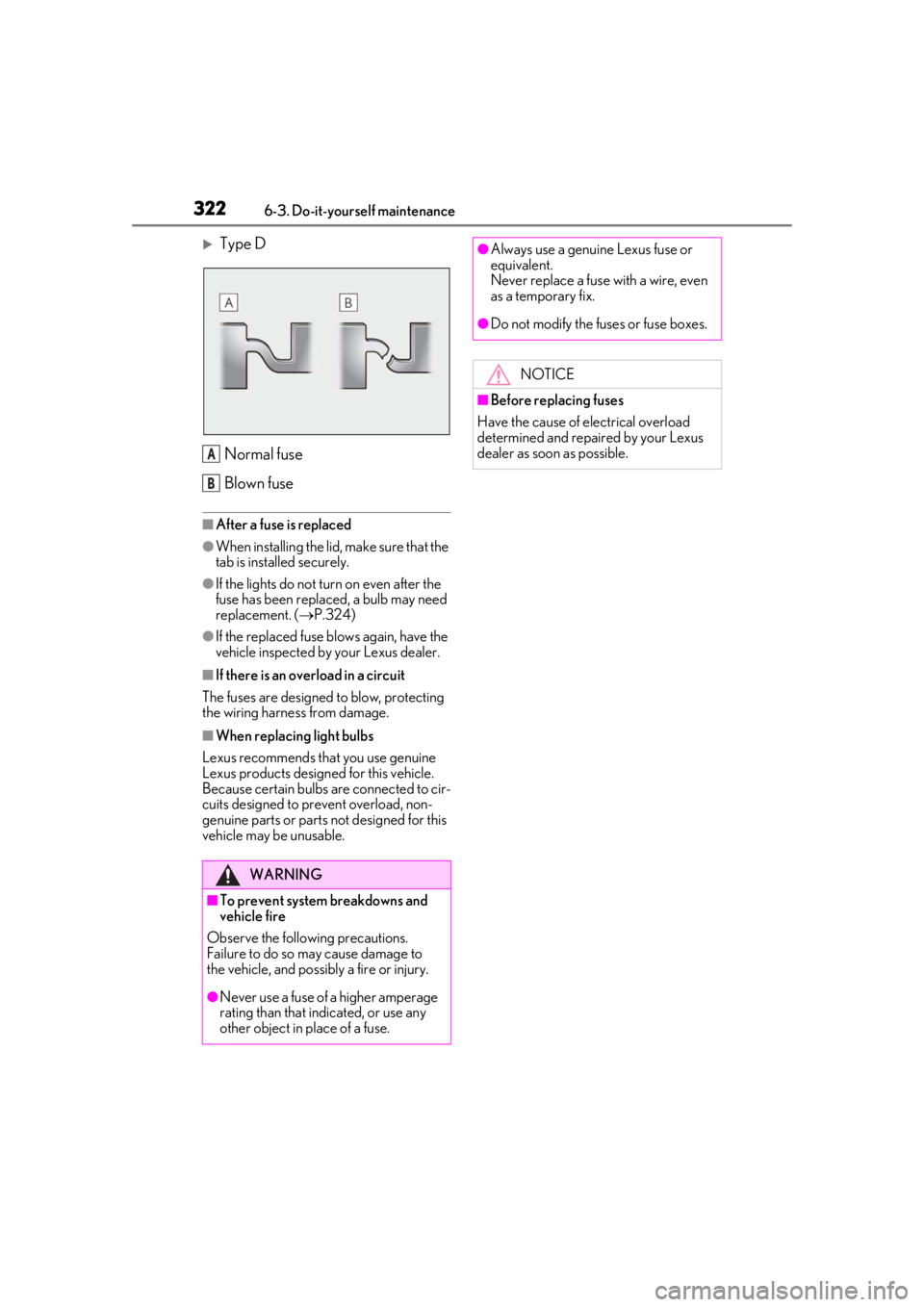
3226-3. Do-it-yourself maintenance
Type DNormal fuse
Blown fuse
■After a fuse is replaced
●When installing the lid, make sure that the
tab is installed securely.
●If the lights do not turn on even after the
fuse has been replaced, a bulb may need
replacement. ( P.324)
●If the replaced fuse blows again, have the
vehicle inspected by your Lexus dealer.
■If there is an overload in a circuit
The fuses are designed to blow, protecting
the wiring harness from damage.
■When replacing light bulbs
Lexus recommends that you use genuine
Lexus products designed for this vehicle.
Because certain bulbs are connected to cir-
cuits designed to prevent overload, non-
genuine parts or parts not designed for this
vehicle may be unusable.
WARNING
■To prevent system breakdowns and
vehicle fire
Observe the following precautions.
Failure to do so may cause damage to
the vehicle, and possibly a fire or injury.
●Never use a fuse of a higher amperage
rating than that indicated, or use any
other object in place of a fuse.
A
B
●Always use a genuine Lexus fuse or
equivalent.
Never replace a fuse with a wire, even
as a temporary fix.
●Do not modify the fuses or fuse boxes.
NOTICE
■Before replacing fuses
Have the cause of electrical overload
determined and repaired by your Lexus
dealer as soon as possible.
Page 324 of 432
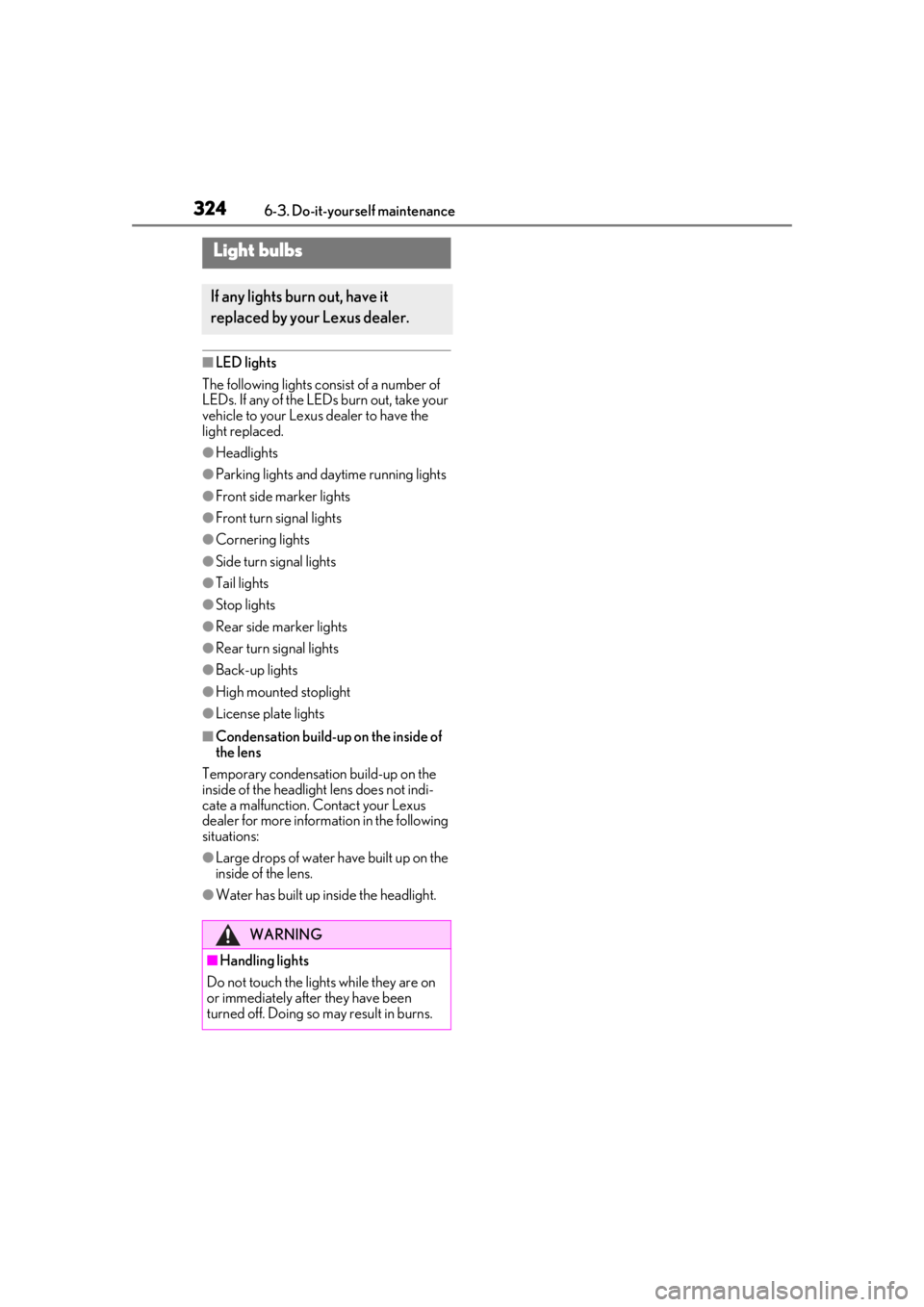
3246-3. Do-it-yourself maintenance
■LED lights
The following lights consist of a number of
LEDs. If any of the LEDs burn out, take your
vehicle to your Lexus dealer to have the
light replaced.
●Headlights
●Parking lights and daytime running lights
●Front side marker lights
●Front turn signal lights
●Cornering lights
●Side turn signal lights
●Tail lights
●Stop lights
●Rear side marker lights
●Rear turn signal lights
●Back-up lights
●High mounted stoplight
●License plate lights
■Condensation build-up on the inside of
the lens
Temporary condensation build-up on the
inside of the headlight lens does not indi-
cate a malfunction. Contact your Lexus
dealer for more information in the following
situations:
●Large drops of water ha ve built up on the
inside of the lens.
●Water has built up inside the headlight.
Light bulbs
If any lights burn out, have it
replaced by your Lexus dealer.
WARNING
■Handling lights
Do not touch the lights while they are on
or immediately after they have been
turned off. Doing so may result in burns.